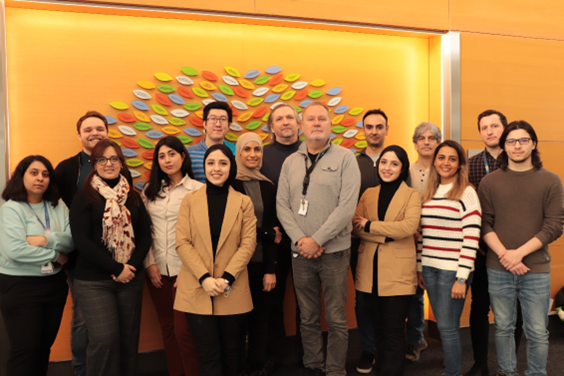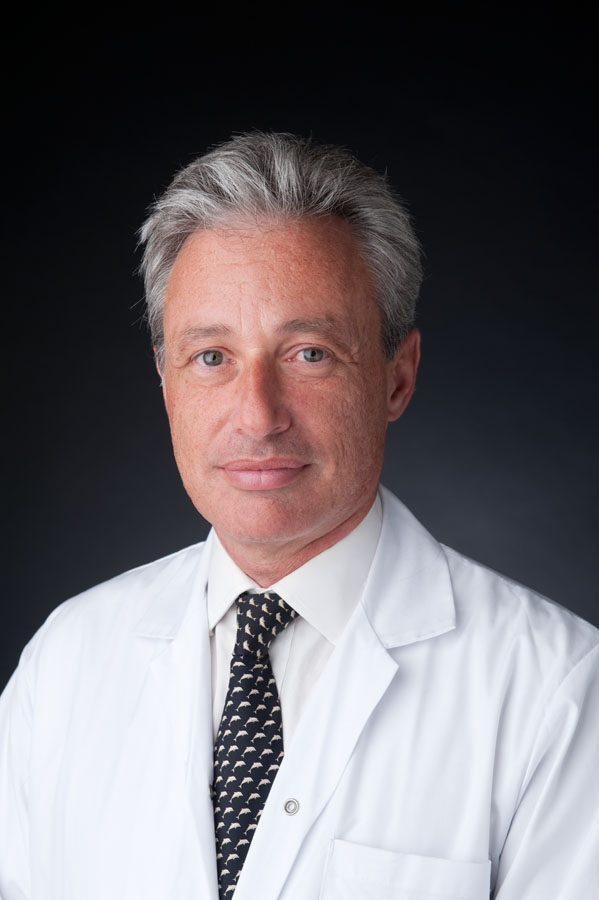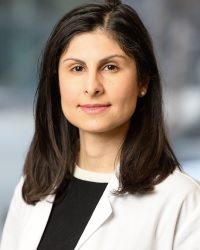Accueil - Laboratoire - Melica N. Brodeur
Le laboratoire de recherche en oncologie gynécologique (LROG) est situé à l’Institut Lady Davis de recherches médicales de l’Hôpital général juif à Montréal, au Québec.
Notre mission est d’améliorer la vie des personnes touchées par les cancers gynécologiques. L’objectif du LROG est de déterminer les lacunes importantes dans les connaissances et d’utiliser la science fondamentale et les connaissances cliniques pour répondre aux aspects non étudiés. Nos objectifs comprennent la compréhension des mécanismes de développement des cancers gynécologiques, l’identification de leurs vulnérabilités et de leur réponse /résistance au traitement ainsi que la découverte de nouvelles thérapies moléculaires ciblées, efficaces et moins toxiques.
Les types de recherche effectués touchent aux thèmes principaux suivants :
Cibler les voies de réparation de l’ADN dans les cancers gynécologiques
Modulation épigénétique et impact sur le microenvironnement tumoral
Élaboration et validation de biomarqueurs prédictifs/pronostiques
Développement d’une plateforme de modèle préclinique pour la prédiction précise de l’efficacité thérapeutique des thérapies ciblées dans les essais cliniques.
La biobanque du cancer gynécologique de l’Hôpital général juif est le résultat de 20 ans de collaborations entre les patients, les cliniciens, les scientifiques et notre laboratoire. Nous avons une large biobanque (tissu, sang, ascite) d’échantillons de patients tout au long de leurs traitements.
Notre biobanque d’oncologie gynécologique est une riche source d’échantillons biologiques qui ont aidé notre équipe de recherche à faire des découvertes importantes dans le domaine des cancers gynécologiques. Cela est rendu possible grâce aux dons généreux des patients et de leurs familles ainsi qu’aux organismes de financement suivants :

Les types de recherches menées portent sur les thèmes suivants :
Cibler les voies de réparation de l’ADN dans les cancers gynécologiques: l’altération de l’expression des gènes de réparation est une caractéristique commune à de nombreux cancers gynécologiques. Les altérations de la réparation de l’ADN peuvent conduire à l’initiation de la tumeur et peuvent être dues à des mutations génétiques, à la régulation transcriptionnelle et aux modifications épigénétiques. Ces altérations peuvent également présenter des vulnérabilités à ces cellules cancéreuses qui peuvent être exploitées. Grâce au soutien de nos patientes-partenaires, notre équipe étudie des échantillons biologiques de patientes afin de déterminer les changements dans les protéines de réparation de l’ADN dans le développement du cancer de l’ovaire et de l’endomètre.
Modulation épigénétique et son impact sur le microenvironnement tumoral : le microenvironnement tumoral (TME) est devenu un domaine de recherche important. Nous comprenons maintenant qu’il existe des facteurs immunosuppresseurs qui favorisent la tumorigénèse et les interactions entre les cellules tumorales et immunitaires et les changements phénotypiques immunitaires qui influencent la réponse / résistance au traitement.
Développement et validation de biomarqueurs prédictifs/pronostiques : une partie de notre mission consiste à personnaliser le traitement des patients et à fournir le bon traitement, au bon moment, au bon patient. L’identification de biomarqueurs pour prédire la réponse à un traitement donné peut potentiellement éviter le sous-traitement ou le surtraitement des patients. L’utilisation des marqueurs pour les déficiences des voies de réparation de l’ADN et les tests non invasifs, tels que l’ADN tumoral circulant, constituent des nouveaux domaines d’intérêt dans notre laboratoire.
Développement d’une plateforme de modèles précliniques : ce thème aborde deux domaines importants : 1) comprendre la biologie fondamentale et l’étiologie de l’initiation et de la progression du cancer gynécologique, et 2) établir des modèles précliniques cliniquement pertinents pour a) améliorer la médecine de précision et b) développer une plateforme pour la prédiction précise de l’efficacité thérapeutique des thérapies ciblées dans les essais cliniques.
Les projets en cours comprennent :
Étudier les cancers gynécologiques rares grâce au séquençage à haut débit des tumeurs soutenu par l’initiative Terry Fox – Marathon de l’espoir et l’élaboration d’un registre national des cancers rares par l’entremise de la Société de gynéco-oncologie du Canada et de cancer de l’ovaire Canada
Étudier le rôle de l’interleukine-10 dans le cancer de l’ovaire
Développement d’un nouveau biomarqueur de protéine de réparation de l’ADN (PARG) dans le cancer de l’ovaire pour déterminer la réponse au traitement.
Étudier rôle des inhibiteurs de PARP et du HRD dans les cancers de l’endomètre
Identification de nouveaux sous-groupes moléculaires de carcinome séreux de l’ovaire de haut grade traités par chimiothérapie néoadjuvante : impact sur le pronostic et le traitement.
Étudier l’importance de la chirurgie robotique pour les patientes atteintes de cancers gynécologiques.
Lorem ipsum dolor sit amet consectetur adipisicing elit. Maxime mollitia, molestiae quas vel sint commodi repudiandae consequuntur voluptatum laborum numquam blanditiis harum quisquam eius sed odit fugiat iusto fuga praesentium optio, eaque rerum! Provident similique accusantium nemo autem. Veritatis obcaecati tenetur iure eius earum ut molestias architecto voluptate aliquam nihil, eveniet aliquid culpa officia aut! Impedit sit sunt quaerat, odit, tenetur error, harum nesciunt ipsum debitis quas aliquid. Reprehenderit, quia. Quo neque error repudiandae fuga? Ipsa laudantium molestias eos sapiente officiis modi at sunt excepturi expedita sint? Sed quibusdam recusandae alias error harum maxime adipisci amet laborum. Perspiciatis minima nesciunt dolorem! Officiis iure rerum voluptates a cumque velit quibusdam sed amet tempora. Sit laborum ab, eius fugit doloribus tenetur fugiat, temporibus enim commodi iusto libero magni deleniti quod quam consequuntur!

After graduating with a BSc in Biology from Nebraska Wesleyan University, Koren Mann obtained a PhD in Pathology/Immunology from Boston University School of Medicine. Following that, she completed a Postdoctoral Fellowship in Oncology at McGill, where she investigated the use of arsenic as a potential chemotherapy in cancer treatment. Today, she is the Chair of the Department of Pharmacology and Therapeutics, an Associate Member of the Department of Medicine, and a Senior Investigator at the Lady Davis Institute for Medical Research.

After graduating with a BSc in Biology from Nebraska Wesleyan University, Koren Mann obtained a PhD in Pathology/Immunology from Boston University School of Medicine. Following that, she completed a Postdoctoral Fellowship in Oncology at McGill, where she investigated the use of arsenic as a potential chemotherapy in cancer treatment. Today, she is the Chair of the Department of Pharmacology and Therapeutics, an Associate Member of the Department of Medicine, and a Senior Investigator at the Lady Davis Institute for Medical Research.
After graduating with a BSc in Biology from Nebraska Wesleyan University, Koren Mann obtained a PhD in Pathology/Immunology from Boston University School of Medicine. Following that, she completed a Postdoctoral Fellowship in Oncology at McGill, where she investigated the use of arsenic as a potential chemotherapy in cancer treatment. Today, she is the Chair of the Department of Pharmacology and Therapeutics, an Associate Member of the Department of Medicine, and a Senior Investigator at the Lady Davis Institute for Medical Research.
After graduating with a BSc in Biology from Nebraska Wesleyan University, Koren Mann obtained a PhD in Pathology/Immunology from Boston University School of Medicine. Following that, she completed a Postdoctoral Fellowship in Oncology at McGill, where she investigated the use of arsenic as a potential chemotherapy in cancer treatment. Today, she is the Chair of the Department of Pharmacology and Therapeutics, an Associate Member of the Department of Medicine, and a Senior Investigator at the Lady Davis Institute for Medical Research.
Mitra is a research associate in the Mann Lab. After finishing her BSc in Physiology at McGill, she began her career at the Lady Davis Institute. Her project explores the role of copper, a metal commonly found in drinking water, in the progression of amyotrophic lateral sclerosis.
Braeden is a PhD candidate in the Department of Pharmacology. He completed an Honours Bachelor of Science at Queen’s University with a specialization in Drug Development and Human Toxicology. His project focuses on elucidating the consequences of organophosphate esters exposure on macrophage function.
Nivetha is a PhD candidate in the Department of Experimental Medicine. She completed her BSc in Biochemistry at Concordia University. Her project focuses on how a co-exposure to metals, such as arsenic and cadmium, affects the progression of atherosclerosis.
Madelyn is a PhD student in the department of Experimental Medicine. She uses mouse modelling to study Diffuse Large B Cell Lymphoma. In particular, she has found that mutations in the transcription factor STAT6 are enriched at disease relapse, and I study how this contributes to remodeling of the tumour microenvironment.
Rowa is a PhD candidate in the department of Experimental Medicine. She completed her BSc in Microbiology and Immunology in Saudi Arabia, then completed two MScs in Genetics and Parasitology at McGill University. Her work investigates tungsten toxicity focusing on SLC2A2 as a transporter and the effects on mature B lymphocytes.
Vincenza is an MSc. Student in the Department of Pharmacology. She completed her BSc. in Pharmacology at McGill University. Her project aims to elucidate the role of e-cigarette use on the murine cardiopulmonary system. Specifically, she is focusing on metal deposition in the lungs, and the progression of atherosclerosis due to these exposures.
Nazli Zengin is an MSc. student in the Department of Pharmacology. She has a background in pharmacology and environment. Her work currently focuses on elucidating how sex and diet modulate arsenic toxicity and its immunological and cardiovascular consequences.
Andrew is an MSc. student in the Department of Pharmacology who graduated from the B.Sc. program in Biochemistry at McGill in 2021. He works on a proteomics project centred around Arsenic 3-Methyltransferase and the question about whether it serves an additional function.
Raymond is an MSc. Student in the Department of Pharmacology who completed his BSc. in Environmental Health Sciences from the UNC Chapel Hill as a as a Morehead-Cain Scholar. He received the McCall MacBain Scholarship in 2021. His project studies the mechanism of tungsten on mTORC1, a major regulator of cell growth and proliferation.
Nikola is an incoming MSc Student who completed his undergraduate degree in
Microbiology and Immunology at McGill University. He is currently working on an NSERC
summer project that assesses the functional characterization of macrophages exposed to arsenic using murine bone marrow-derived macrophages.
Roni is a second-year BSc student in Chemistry at McGill. As an undergraduate student, she works on various projects across the lab, but is currently focused elucidating the correlation between nonalcoholic fatty liver disease and vaping.
Dr. Wilson Miller, Lady Davis Institute, Montreal
Dr. Sonia del Rincon, Lady Davis Institute, Montreal
Dr. Carolyn Baglole, RI-MUHC, McGill University, Montreal
Dr. Jun Ding, RI-MUHC, McGill University, Montreal
Dr. Susan Gaskin, Department of Chemical Engineering, McGill University, Montreal
Dr. Bernard Robaire, Department of Pharmacology McGill University, Montreal
Dr. Brandon Pearson, Columbia University, New York
Dr. John Wise, University of Louisville, Kentucky
Dr. Wilson Miller, Lady Davis Institute, Montreal
Dr. Sonia del Rincon, Lady Davis Institute, Montreal
Dr. Carolyn Baglole, RI-MUHC, McGill University, Montreal
Dr. Jun Ding, RI-MUHC, McGill University, Montreal
Dr. Susan Gaskin, Dep’t of Chemical Engineering, McGill University, Montreal
Dr. Bernard Robaire, Dep’t of Pharmacology McGill University, Montreal
Dr. Brandon Pearson, Columbia University, New York
Dr. John Wise, University of Louisville, Kentucky
Lorem ipsum dolor sit amet consectetur adipisicing elit. Maxime mollitia, molestiae quas vel sint commodi repudiandae consequuntur voluptatum laborum numquam blanditiis harum quisquam eius sed odit fugiat iusto fuga praesentium optio, eaque rerum! Provident similique accusantium nemo autem. Veritatis obcaecati tenetur iure eius earum ut molestias architecto voluptate aliquam nihil, eveniet aliquid culpa officia aut! Impedit sit sunt quaerat, odit, tenetur error, harum nesciunt ipsum debitis quas aliquid. Reprehenderit, quia. Quo neque error repudiandae fuga? Ipsa laudantium molestias eos sapiente officiis modi at sunt excepturi expedita sint? Sed quibusdam recusandae alias error harum maxime adipisci amet laborum. Perspiciatis minima nesciunt dolorem! Officiis iure rerum voluptates a cumque velit quibusdam sed amet tempora. Sit laborum ab, eius fugit doloribus tenetur fugiat, temporibus enim commodi iusto libero magni deleniti quod quam consequuntur!
Walter Gotlieb :
Melica Brodeur :
Braeden Giles:
Andrew Little:
Nikola Kukolj:
Lorem ipsum dolor sit amet consectetur adipisicing elit. Maxime mollitia, molestiae quas vel sint commodi repudiandae consequuntur voluptatum laborum numquam blanditiis harum quisquam eius sed odit fugiat iusto fuga praesentium optio, eaque rerum! Provident similique accusantium nemo autem. Veritatis obcaecati tenetur iure eius earum ut molestias architecto voluptate aliquam nihil, eveniet aliquid culpa officia aut! Impedit sit sunt quaerat, odit, tenetur error, harum nesciunt ipsum debitis quas aliquid. Reprehenderit, quia.
Dr. Wilson Miller, Lady Davis Institute, Montreal
Dr. Sonia del Rincon, Lady Davis Institute, Montreal
Dr. Carolyn Baglole, RI-MUHC, McGill University, Montreal
Dr. Jun Ding, RI-MUHC, McGill University, Montreal
Dr. Susan Gaskin, Dep’t of Chemical Engineering, McGill University, Montreal
Dr. Bernard Robaire, Dep’t of Pharmacology McGill University, Montreal
Dr. Brandon Pearson, Columbia University, New York
Dr. John Wise, University of Louisville, Kentucky
Lorem ipsum dolor sit amet consectetur adipisicing elit. Maxime mollitia, molestiae quas vel sint commodi repudiandae consequuntur voluptatum laborum numquam blanditiis harum quisquam eius sed odit fugiat iusto fuga praesentium optio, eaque rerum! Provident similique accusantium nemo autem. Veritatis obcaecati tenetur iure eius earum ut molestias architecto voluptate aliquam nihil, eveniet aliquid culpa officia aut! Impedit sit sunt quaerat, odit, tenetur error, harum nesciunt ipsum debitis quas aliquid. Reprehenderit, quia. Quo neque error repudiandae fuga? Ipsa laudantium molestias eos sapiente officiis modi at sunt excepturi expedita sint? Sed quibusdam recusandae alias error harum maxime adipisci amet laborum. Perspiciatis minima nesciunt dolorem! Officiis iure rerum voluptates a cumque velit quibusdam sed amet tempora. Sit laborum ab, eius fugit doloribus tenetur fugiat, temporibus enim commodi iusto libero magni deleniti quod quam consequuntur!
Nous sommes reconnaissants du soutien financier que nous recevons des organismes de financement et des donateurs privés. Avec votre soutien, nous serons capables de faire des découvertes cliniques significatives pour améliorer les soins aux patients.
Remerciements particuliers à :
Fonds de Recherche du Québec – Santé
Instituts de recherche en santé du Canada (IRSC)
Fondation Gloria Girls Gloria Shapiro
Fondation canadienne pour la santé des femmes
Fonds commémoratif Francine Grzywacz
Fondation Friends for Life
Fonds Garber
Association israélienne contre le cancer
Fonds israélien de recherche sur le cancer
Fondation de l’HGJ
Fonds de la famille Levy
Reseau de recherche sur le cancer
Fonds Susan et Jonathan Wener
Fonds Visman de l’Université de Tel Aviv
Week-end pour vaincre les cancers féminins
3755, Ch. Côte Ste-Catherine
Montréal, Québec H3T 1E2
Courriel :
Faire la différence, vous avez ce don! Votre contribution soutiendra la recherche essentielle menée à l’Institut Lady Davis qui permettra la prévention des maladies, des diagnostics plus précis, des dépistages plus rapides, des traitements innovants et plus performants, une meilleure qualité de vie, le bien-être et l’espoir pour nous tous.
Copyright © 2024 | Lady Davis Institute for Medical Research/Jewish General Hospital
Conception et développement : Yankee Media